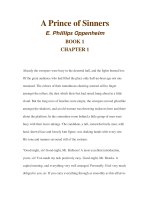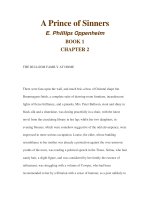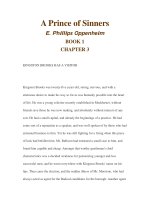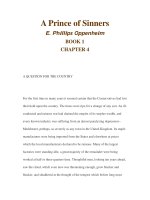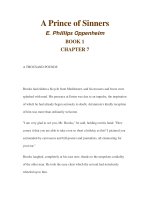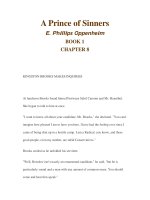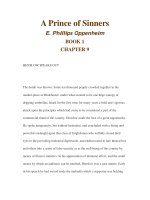A Prince of Sinners E. Phillips Oppenheim BOOK 2 CHAPTER 7 doc
Bạn đang xem bản rút gọn của tài liệu. Xem và tải ngay bản đầy đủ của tài liệu tại đây (27.38 KB, 11 trang )
A Prince of Sinners
E. Phillips Oppenheim
BOOK 2
CHAPTER 7
BROOKS AND HIS MISSIONS
"Now then, please," Brooks said, dipping his pen in the ink.
A lady of ample proportions, who had been standing since the commencement
of the proceedings with her hand tightly grasping the leg of Brooks' table, gave
a final shove of discomfiture to a meek-faced girl whom she had suspected of an
attempt to supersede her, and presented herself before the desk.
"I'm first," she declared, firmly; "been 'ere for four mortal hours."
"What is your name, please?" Brooks asked.
"Mrs. Robert Jones, No. 4, St. Mary's Court, down Fennell Street leastways
you go that way from 'ere. I'm a widow woman with four children, and lost me
husband on the railway. What I wants is a suit of clothes for my Tommy, he's
five-and-'arf, and stout for his years, and a pair of boots for Selina Ann. And I'm
not a saying," she continued, blandly, "as me having waited 'ere so long, and
this being a sort of opening ceremony, as a pound of tea for myself wouldn't be
a welcome and reasonable gift. And if the suit," she concluded, breathlessly,
"has double-seated breeches so much the better."
Brooks maintained the most perfect composure, although conscious of a
suppressed titter from behind. He commenced to write rapidly in his book, and
Mrs. Jones, drawing her shawl about her, looked around complacently.
Suddenly she caught the ripple of mirth, which some of Brooks' helpers were
powerless to control. Her face darkened.
"Which is little enough to ask for," she declared, truculently, "considering as it's
four mortal hours since I first laid hold of the leg of that table, and neither bite
nor sup have I had since, it not being my habit," she continued, slowly, and
staring intently at the hang of her neighbour's skirt, "to carry bottles in my
pocket."
Brooks looked up.
"Thank you, Mrs. Jones," he said. "I have entered your name and address, and I
hope we shall see you again soon. This young lady," he indicated Mary, "will
take you over to our clothes department, and if we haven't anything to fit
Tommy you must come again on Wednesday, when we shall have a larger
supply."
"I'll take the nearest you've got to-day," she decided, promptly. "Wot about the
tea?"
"We shall be glad to ask you to accept a small packet," Brooks answered. "By
the bye, have you a pension from the railway company?"
"Not a penny, sir," she declared, "and a burning shame it is."
"We must see into it," Brooks said. "You see that gentleman behind me?"
"Him with the squint?" she asked, doubtfully.
Brooks bent over his book.
"Mr. Fellows, his name is," he said. "He is one of our helpers here, and he is a
lawyer. You can tell him all about it, and if we think you have a claim we will
try and see what we can do for you. Now, if you please, we must get on. Come
in any time, Mrs. Jones, and talk to us. Some one is, always here. What is your
name, please?"
"Amy Hardinge!"
There was a howl of derision from the rear. The girl, pallid, with large dark
eyes, a somewhat tawdry hat and torn skirt, turned angrily around.
"Who yer shouting at, eh? There ain't so many of yer as knows yer own names, I
dir say, and 'Ardinge's as good as any other. Leave a body be, won't yer?"
She turned round to Brooks, and disclosed a most alarming rent in her gown.
"Look 'ere, guv'nor," she said, "that's my name, and I 'as a back room behind old
Connel's fish-shop next door but one to 'ere. If yer want to give away things to
them as wants 'em, wot price a new skirt 'ere, eh?"
A woman from the rear leaned over to Brooks.
"The 'ussy," she said. "Don't you take no notice of 'er, sir. We all knows 'er and
precious little good there is ter know."
Miss Hardinge was not unreasonably annoyed. She turned round with flashing
eyes and belligerent attitude.
"Who the 'ell asked you anything?" she exclaimed. "Can't yer keep your
bloomin' mouths closed?"
A pale-faced little man pushed his way through the throng. He was dressed in a
semi-clerical garb, and he tapped Brooks on the shoulder.
"Can you favour me with one moment's private conversation, sir?" he said. "My
name is John Deeling, and I am a minister of the Gospel. The Mission House in
Fennell Street is my special charge."
"Glad to know you, Mr. Deeling," Brooks answered, "but I can't spare any time
for private conversation now. Can't you speak to me here?"
Mr. Deeling looked doubtfully at the girl who stood still before the desk, silent,
but breathing hard. A sullen shade had fallen upon her face. She looked like a
creature at bay.
"It is concerning-this unfortunate young person."
"I can assure you," Brooks said, dipping his pen in the ink, "that no
recommendation is necessary. I shall do what I can for her."
"You misapprehend me, sir," Mr. Deeling said, with some solemnity. "I regret
to say that no recommendation is possible. That young person is outside the pale
of all Christian help. I regret to speak so plainly before ladies, sir, but she is a
notorious character, a hardened and incurable prostitute."
Brooks looked at him for a moment fixedly.
"Did I understand you to say, sir, that you were a minister of the Gospel?" he
asked.
"Certainly! I am well known in the neighbourhood."
"Then if you take my advice," Brooks said, sternly, "you will take off those
garments and break stones upon the street. It is to help such unfortunate and
cruelly ill-used young women as this that I and my friends have come here. Be
off, sir. Miss Hardinge, this young lady will take you to our clothes store in the
inner room there. I hope you will permit us to be of some further use to you
later on."
The girl, half dazed, passed away. Mr. Deeling, his face red with anger, turned
towards the door.
"You may call it a Christian deed, sir," he exclaimed, angrily, "to encourage
vice of the worst description. We shall see what the bishop, what the Press, have
to say about it."
"I don't care a snap of the fingers what you, or the bishop, or time Press have to
say," Brooks rejoined, equably; "but lest there should be those here who agree
with your point of view, let them hear this from me at once, to prevent
misunderstanding. We are here to help to the best of our ability all who need
help, whatsoever their characters. They are equally welcome to what we have to
offer, whether they be thieves, or prostitutes, or drunkards, or respectable men
and women. But if I were asked what really brought me here, for what class of
people in the world my sympathy and the sympathies of my friends have been
most warmly kindled, I should say, for such as that young woman who has just
presented herself here. If she asks for them, she will have from us food and
clothes and the use of our baths and reading-rooms whenever she chooses, and I
will guarantee that not one of my women friends here who come in contact with
her will ask a single question as to her mode of life, until she invites their
confidence. If you think that she is responsible for her present state, you and I
differ if you think that one shadow of blame rests upon her, we differ again.
And if there are any more like her in the room, let them come out, and they shall
have all that they ask for, that it is within our power to give."
"Hear, hear, guv'nor!"
"That's ginger for 'im."
"Out of this, old white choker. There's beans for you."
They let him pass through. On the threshold he turned and faced Brooks again.
"At least," he said, "I can promise you this. God's blessing will never be upon
your work. I doubt whether you will be allowed to continue it in this Christian
country."
Brooks rose to his feet.
"Mr. Deeling," he said, "you and your mission system of work amongst the poor
have been fighting a losing battle in this country for fifty years and more. A
Christian country you call it. Go outside in the streets. Look north and south,
east and west, look at the people, look at their children, look at their homes. Is
there one shadow of improvement in this labyrinth of horrors year by year,
decade by decade? You know in your heart that there is none. Therefore if new
means be chosen, do not condemn them too rashly. Your mission houses, many
of them, have been nothing but breeding-places for hypocrisy. It is time the old
order was changed. Now, sir, you are next. What can we do for you?"
A weary-looking man with hollow eyes and nervously-twitching fingers found
himself pushed before the desk. He seemed at first embarrassed and half dazed.
Brooks waited without any sign of impatience. When at last he spoke, it was
without the slightest trace of any Cockney accent.
"I I beg your pardon, sir! I ought not perhaps to intrude here, but I don't know
who needs help more than I do."
"He's orl right, sir," sung out the costermonger. "He is a bit queer in the 'ead, but
he's a scholar, and fair on his uppers. Speak up, Joe."
"You see, my friends are willing to give me a character, sir," the man remarked,
with a ghost of a smile. "My name is Edward Owston. I was clerk at a large
drapery firm, Messrs. Appleby, Sons, and Dawson, in St. Paul's Churchyard, for
fourteen years. I have a verified character from them. They were obliged to cult
down their staff, owing to foreign competition, and I have never succeeded in
obtaining another situation. There is nothing against me, sir. I would have
worked for fifteen shillings a week. I walked the streets till my boots were worn
through and my clothes hung around me like rags. It was bad luck at first
afterwards it was my clothes. I have been selling matches for a month it has
brought me in two shillings a week."
"How old are you?" Brooks asked. "Thirty-four, sir." Brooks nearly dropped his
pen.
"What?" he exclaimed.
"Thirty-four, sir. It is four years since I lost my situation."
The man's hair was grey, a little stubbly grey beard was jutting out from his
chin. His eyes were almost lost in deep hollows. Brooks felt a lump in his
throat, and for a moment pretended to be writing busily. Then he looked up.
"We shall give you a fresh start in life, Edward Owston," he said. "Follow this
gentleman at my left. He will find you clothes and food. To-morrow you will go
to a cottage which belongs to us at Hastings for one month. Afterwards, if your
story is true, we shall find you a suitable situation if it is partially true, we shall
still find you something to do. If it is altogether false we cannot help you, for
absolute truth in answering our questions is the only condition we impose." The
man never uttered a word. He went out leaning upon the arm of one of Brooks'
assistants. Another, who was a doctor, after a glance into the man's face,
followed them. When he returned, after about twenty minutes' absence, he
leaned forward and whispered in Brooks' ear "You'll never have to find a
situation for that poor fellow. A month's about all he's good for." Brooks looked
round shocked. "What is it drink?" he asked. The doctor shook his head.
"Not a trace of it. Starvation and exhaustion. If I hadn't been with him just now
he'd have been dead before this. He fainted away."
Brooks half closed his eyes.
"It is horrible!" he murmured.
The costermonger was next. Brooks looked around the room and at the clock.
"Look here," he said. "If I sit here till tomorrow I can't possibly attend to all of
you. I tell you what I'll do. If you others will give place to those whose cases are
really urgent, I'll be here at seven to-morrow morning till seven at night, and the
next day too, if necessary. It's no good deputing any one else to tell me, because
however many branches we open and I hope we shall open a great many I
mean to manage this one myself, and I must know you all personally. Now are
you all agreeable?"
"I am for one," declared the costermonger, moving away from before the desk.
"I ain't in no 'urry. I've 'ad a bit o' bad luck wi' my barrer, all owing to a
plaguing drunken old omnibus-driver, and horl I want is a bit o' help towards
the security. Josh Auk wants it before he'll let me out a new one. Tomorrow's
horl right for me."
"Well, I expect we'll manage that," Brooks remarked. "Now where are the
urgent cases?"
One by one they were elbowed forward. Brooks' pen flew across the paper. It
was midnight even then before they had finished. Brooks and Mary Scott left
together. They were both too exhausted for words.
As they crossed the street Mary suddenly touched his arm.
"Look!" she whispered.
A girl was leaning up against the wall, her face buried in her hands, sobbing
bitterly. They both watched her for a moment. It was Amy Hardinge.
"I will go and speak to her," Mary whispered.
Brooks drew her away.
"Not one word, even of advice," he said. "Let us keep to our principles. The end
will be surer."
They turned the corner of the street. Above the shouting of an angry woman and
the crazy song of a drunken man the girl's sobs still lingered in their ears.
